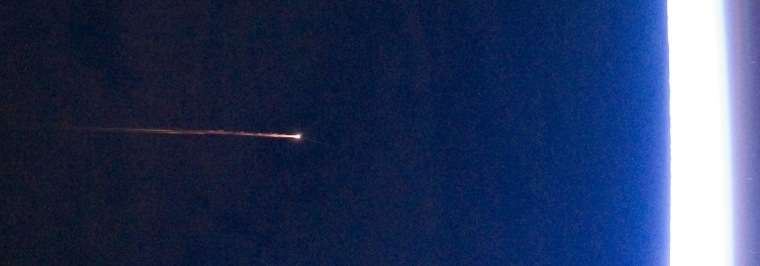The Russian space agency said its wayward robotic cargo spaceship was destroyed during a fiery plunge through Earth's atmosphere over the Pacific Ocean late Thursday.
Roscosmos reported in a tweet and a Web update that the Progress M-27M spacecraft — which was launched on April 28 but failed to rendezvous with the International Space Station for a delivery — "ceased to exist" at 10:04 p.m. ET Thursday (02:04 UTC Friday). It was sailing over the central Pacific at the time, Roscosmos said.
Some satellite-watchers questioned whether the initial Russian report was based on actual observations, or merely on advance projections for atmospheric re-entry.
The report was roughly in line with predictions from satellite monitoring agencies ranging from the U.S. Strategic Command to the European Space Agency's Space Debris Office. After the Roscosmos announcement, the U.S. Strategic Command reported a later time for re-entry — 10:20 p.m. (02:20 UTC). That would put the Progress over the Pacific, off the coast of Chile, when it broke up.
Skywatchers had reported visual sightings of the spaceship as it passed overhead for its final orbits, but the sightings tailed off as re-entry time approached. There were no immediate reports of the fireworks that would be associated with the Progress craft's breakup — and no reports of injuries or damage due to space debris.
Holger Krag, the head of ESA's Space Debris Office, said the Progress craft appeared to be tumbling very quickly, at a rate of one revolution every 1.8 seconds, as it descended toward the atmosphere. The unpredictability of atmospheric drag forces added to the uncertainty over the precise time of re-entry.

The Progress 59 craft, also known as Progress M-27M, was supposed to carry 3 tons of fuel, supplies and equipment to the space station on April 28. But something went wrong after its launch from Russia's Baikonur Cosmodrome in Kazakhstan, and the robotic cargo ship ended up in an orbit that made a rendezvous with the station impossible.
A day after launch, the Russians said the $51 million resupply mission was a total loss. They began an investigation into the mission failure, and the preliminary word was that there may have been an explosion when the Progress separated from the third stage of the Soyuz rocket that launched it.
NASA and the Russians say there are enough supplies aboard the station to keep the crew in good shape until well after the next shipment arrives. That's likely to be a robotic SpaceX Dragon resupply mission, currently scheduled for June.
Three astronauts had been due to fly to the station in a Russian Soyuz spacecraft on May 26 as part of a regular crew rotation, but on Thursday, Russia's TASS news agency quoted an unnamed source in the space industry as saying that launch would be rescheduled for June 11.
The TASS report did not cite a reason for the delay, but the investigation into the Progress failure could have a bearing on the Soyuz schedule.
For more about the Progress craft's descent, check these websites:
